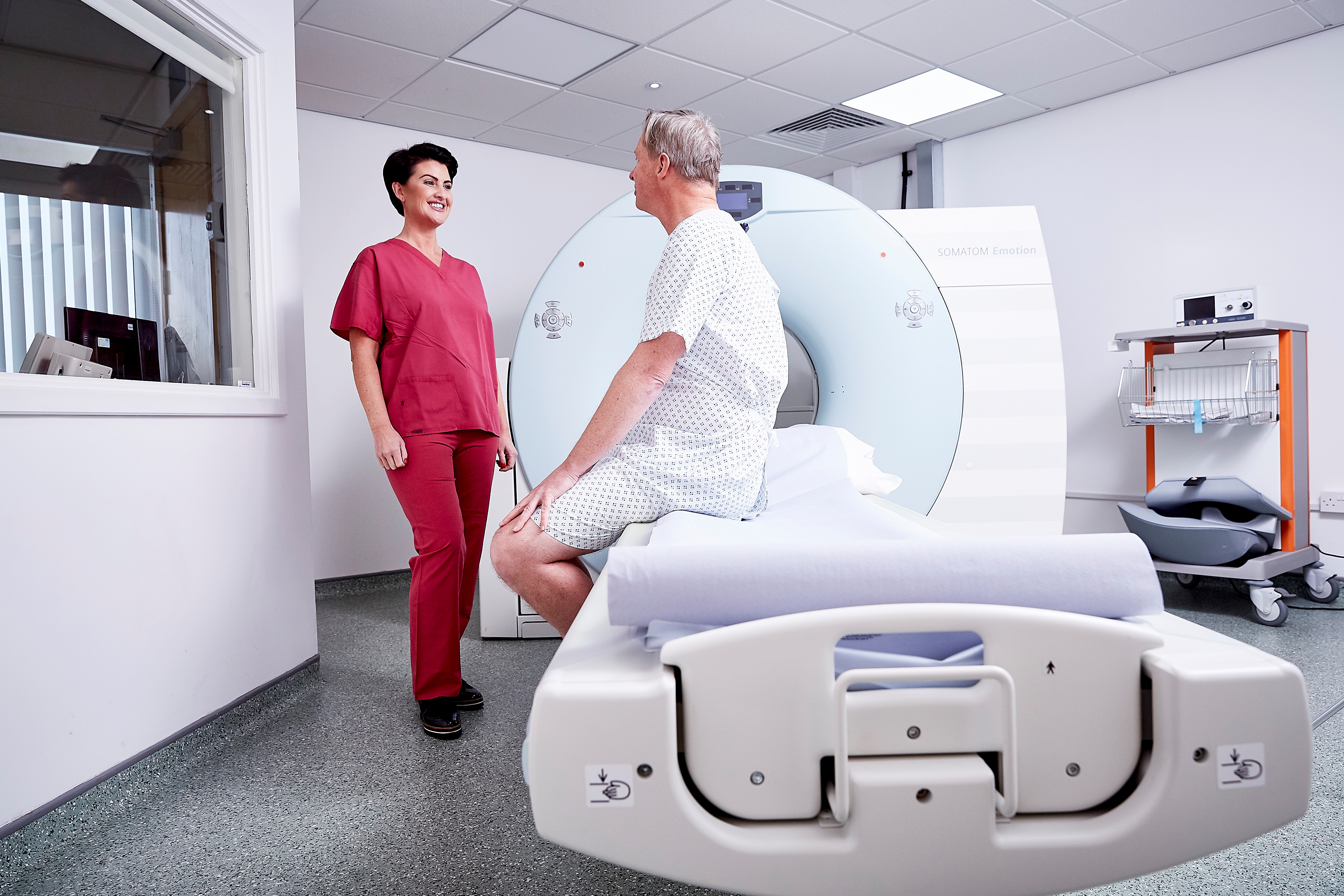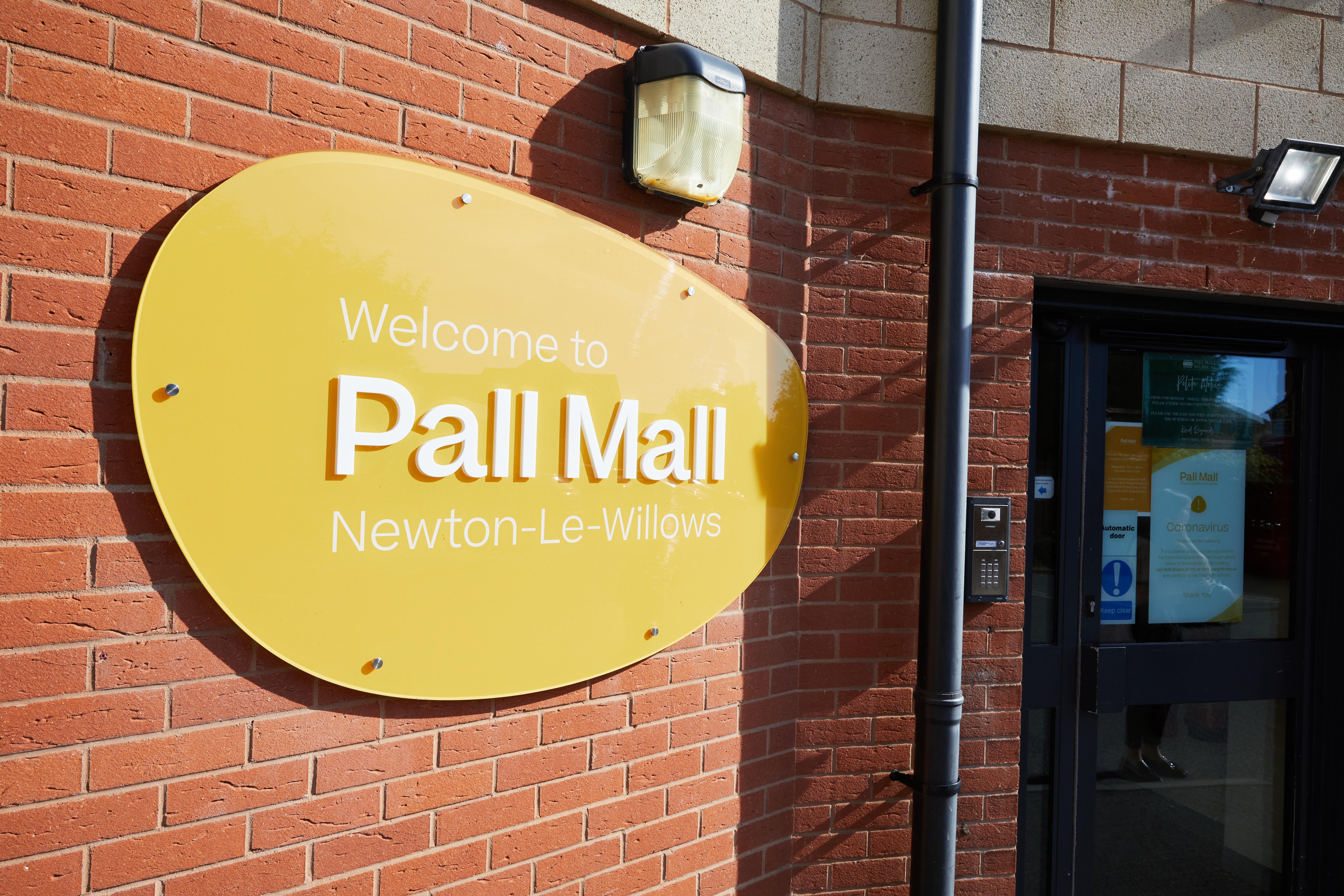This is why our patients rate us Excellent on Trustpilot.

Fast, Accurate CT Scan from £430
- Instant access + Fast results
- Appoinments available 7 days a week
- No NHS referral
- Expert radiologists
With a range of appointment times including after work, your health can come first.

Going private with Pall Mall
There are many reasons why people might start considering going private, especially when it comes to CT Scans. From long waiting lists and limited appointment times on the NHS, we understand the frustration that comes when you’re waiting on results - or simply waiting to be seen.
Those in need of urgent medical care can access our CT Scan services quickly, providing prompt support after consultation or for those who wish to be seen quickly without a referral.
Accessing the care you need couldn’t be simpler with Pall Mall.
Being a patient with us gives you unrivalled access to our own private hospital, based in Newton-le-Willows, so you can get the treatment you need with no fuss, no waiting, and no complications. Our hospital offers comprehensive care and high-end technology for you.
But we know that life goes on. That's why our highly-trained professionals have a wide selection of appointments available throughout the day, including after work hours, so your health can always come first, no matter the schedule.
What to expect
Feeling nervous? Or just want to learn more about the process? See each step in detail so you know exactly what to expect! At Pall Mall, we’re here to make your CT scan experience as smooth and comfortable as possible. From the moment you step into our hospital to your follow-up consultation, we’ll guide you through every step of the journey. Our expert team is dedicated to ensuring a stress-free experience in a relaxed and professional environment, so you can feel confident in your care.
How to prepare for a private CT Scan
There aren’t any special preparations you especially need to make on the day of your scan.
Simply arrive at our private hospital in Newton-le-Willows a little ahead of your planned appointment time and a friendly member of our team will direct you to the right place - we'll sort the rest.
Apart from remembering not to wear any metal, or having switched out any piercings for appropriate retainers, wearing loose and comfortable clothing might be a good idea.
Before you step into the scanning suite, you'll be asked to do the following:
Take off any jewellery or metallic accessories, such as a watch.
You will then remove all - or most - of your clothing and change into a medical gown.
However, depending on the area being scanned, you may be able to leave some clothes on - so make sure you take everything out of your pockets before entering the scanner.
To help improve image quality, you may have something called contrast material (a medical dye) put into your arm through a tube called an IV.
Once these are all boxed off, you can then carry on with the procedure.
Using 'Contrast Material' for medical imaging
For some CT scans, a special dye called contrast material is required to help highlight the areas of your body that are being looked at by your radiographer.
Contrast material blocks X-rays and shows up white on images, which 'light up' blood vessels, intestines, or other structures - giving us a better understanding of where issues might lie.
Contrast material might be given to you:
Intravenously: The most common method of administering contrast agents, a nurse or assistant can inject it using a thin, flexible plastic tube called an IV. A device is inserted into a vein in the arm to enhance the clarity of imaging for the gallbladder, urinary tract, liver or blood vessels.
Orally: Contrast material may be administered orally if imaging of the oesophagus or stomach is required.
Rectally: A contrast material may be inserted in your rectum to help radiographers fully visualise your intestines. As with other procedures, such as colonoscopies, this might make you feel a little uncomfortable or 'bloated', but it soon passes.
With most contrast materials administered by injection, you might feel a quick sting or pinching sensation when the IV is started.
The dye may make you feel warm or flushed and give you a metallic taste in your mouth. Some people feel sick or get a headache. Tell the radiologist or your doctor how you are feeling during the scan but don't worry, this will usually fade once the substance has passed out of your system.
Generally, radiologists believe that no special precautions are needed when breastfeeding and having a scan that involves contrast agents. Please consult your doctor if you have any concerns regarding the safety of dye usage in tests.
What happens during the scan?
Once you're prepped and have changed into a hospital gown (if required for your scan), you'll be taken to the CT scanning room and asked to lie on your back on a flatbed. The CT scanner consists of a ring that rotates around a small section of your body as you pass through it. Unlike an MRI scanner, it doesn’t fully enclose you, so you won’t feel enclosed or claustrophobic.
The radiographer will operate the scanner from the next room and communicate with you via an intercom system, providing instructions and checking in with you throughout. Before the scan begins, the machine will be positioned around the area of your body that needs investigating.
During the scan, the bed moves incrementally to complete the imaging. It’s important to remain still and maintain normal breathing to ensure clear, high-quality images. You may also be asked to breathe in, breathe out, or hold your breath at certain points.
The scan itself takes around 10 to 20 minutes, making it one of the quickest and easiest diagnostic procedures. Once it’s complete, the radiographer will let you know when you can move and get dressed.
What happens after the scan?
Generally, it only takes a few minutes to complete a CT scan, but you may have to stay around a bit afterward.
Although your time in the scanning suite will be relatively brief, you could be needed at the hospital for approx 30-60 minutes in total. This is to make sure you're safe to go home, as your healthcare team will be keen to check that everything has gone smoothly and you're feeling fit before heading back. For example, when you receive a contrast medium from a radiographer, you must wait to make sure you haven't reacted.
If you're feeling well following your scan, you can simply continue with your daily activities, such as driving and returning to work or back home if you choose to.
After your private CT scan at Pall Mall, you'll receive a full report from your expert radiologist explaining the results and whether any further tests or consultations are required.
CT scan results are considered to be normal if the radiologist doesn’t discover anything abnormal in the images.
But if anything is spotted, we'll arrange a consultation to discuss our findings, any concerns and how we'll move forward to help your health - together.
Are CT scans a safe procedure?
A CT Scan is a very safe procedure, with only a small amount of X-ray radiation exposure. The diagnostic benefits often far outweigh this minimal risk.
It’s also one of the simplest and most straightforward ways to identify the cause of a medical issue, though we understand it might feel a bit intimidating.
To put it into perspective, the average radiation dose from a CT Scan is roughly equivalent to what you’d naturally be exposed to over about three years in everyday environments.
But as with any medical procedure, there are small risks involved. These may be:
You could have an allergic reaction to the contrast dye used
There is an increased risk to developing babies during pregnancy, which is why we advise against CT scans for pregnant women.
Mild exposure to ionising radiation
During CT Scans, radiation exposure may increase your chances of developing cancer many years later - but this risk is extremely small (less than 1 in 2,000) because the radiation doses are very low.
It's important to note that the amount of radiation you're exposed to during a CT scan can vary, depending on how much of your body is scanned.
But don't worry, as most scanners are designed to make sure you're not exposed to unnecessarily high levels.
In other diagnostic situations, such as gallstones, an abdominal CT scanning may not be able to detect them with the same sensitivity as an abdominal ultrasound. Your doctor will decide which method will work best for the desired results.
Finally, in certain circumstances, MRI evaluation and diagnosis may be advantageous compared to CT scanning for liver, kidney, pancreatic, uterine, or ovarian abnormalities.
As always, your Pall Mall radiographer and doctor will make choices based on your unique anatomy and circumstances, to determine the best way forward.
Enquire About Our Services
A member of our team will be in touch with you to discuss your requirements.






